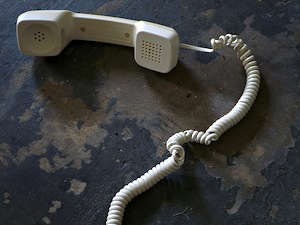Millions of Verizon Phone Records Secretly Collected Daily (Video)
The National Security Agency is collecting the telephone records of millions of American customers of Verizon via an order that requires the company to hand over the records on an "ongoing, daily basis," Glenn Greenwald reports in The Guardian.The National Security Agency is collecting the telephone records of millions of American customers of Verizon on an "ongoing, daily basis."
The National Security Agency is collecting the telephone records of millions of American customers of Verizon via an order that requires the company to hand over the records on an “ongoing, daily basis,” Glenn Greenwald reports in The Guardian.
The monitored calls are both within the U.S. and between U.S. parties and parties in other countries. For the first time, the public sees documentation that the Obama administration is engaged in a massive violation of what were once regarded as civil liberties of privacy by indiscriminately collecting millions of communication records regardless of whether the callers are suspected of doing anything wrong.
The order was granted by the Foreign Intelligence Surveillance Court on April 25 of this year. It gave the government unlimited authority to obtain the records through July 19. It requires that the numbers of both parties be revealed, as well as location data, “unique identifiers,” and the time and duration of the calls. The data does not reveal the content of the conversations.
The order forbids Verizon from informing the public of the order and the existence of the FBI’s request of customer records.
The NSA, the White House and the Department of Justice all declined to comment when The Guardian approached them about the order in advance of publication of the story Wednesday.
As a presidential candidate in 2008, President Obama pledged to order the attorney general to “conduct a comprehensive review of all our surveillance programs, and to make further recommendations on any steps needed to preserve civil liberties and to prevent executive branch abuse in the future.” Instead of that review, however, it appears likely that Obama’s Justice Department will pursue the source of the leak of the order to The Guardian.
That probability was confirmed after publication of The Guardian’s article by Pete Williams, a Justice correspondent for NBC News whom The Huffington Post described as “well sourced.”
The disclosure could shove the issue of privacy back into the media spotlight. Kate Martin of the Center for National Security Studies, a civil liberties advocacy group, was quoted in The New York Times as saying: “absent some explanation I haven’t thought of, this looks like the largest assault on privacy since the N.S.A. wiretapped Americans in clear violation of the law” under the Bush administration. “On what possible basis has the government refused to tell us that it believes that the law authorizes this kind of request?”
— Posted by Alexander Reed Kelly
Glenn Greenwald at The Guardian:
The information is classed as “metadata”, or transactional information, rather than communications, and so does not require individual warrants to access. The document also specifies that such “metadata” is not limited to the aforementioned items. A 2005 court ruling judged that cell site location data – the nearest cell tower a phone was connected to – was also transactional data, and so could potentially fall under the scope of the order.
While the order itself does not include either the contents of messages or the personal information of the subscriber of any particular cell number, its collection would allow the NSA to build easily a comprehensive picture of who any individual contacted, how and when, and possibly from where, retrospectively.
It is not known whether Verizon is the only cell-phone provider to be targeted with such an order, although previous reporting has suggested the NSA has collected cell records from all major mobile networks. It is also unclear from the leaked document whether the three-month order was a one-off, or the latest in a series of similar orders.
‘Democracy Now!’:
Your support matters…Independent journalism is under threat and overshadowed by heavily funded mainstream media.
You can help level the playing field. Become a member.
Your tax-deductible contribution keeps us digging beneath the headlines to give you thought-provoking, investigative reporting and analysis that unearths what's really happening- without compromise.
Give today to support our courageous, independent journalists.





